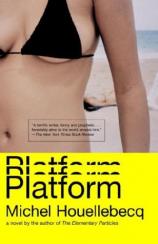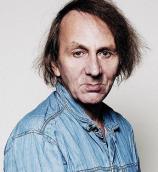Reading Group Guide
Discussion Questions
Platform

1. What kind of narrator is Michel Renault? How does he view the world? How is he different from the narrators of most contemporary fiction?
2. Michel admires Agatha Christie for her "Dickensian sense of wonder" and her depiction of despair: "This was despair --- this utter outer darkness of coldness and loneliness. And the sin of despair, that priests talked of, was a cold sin, the sin of cutting oneself off from all warm and living human contacts" [p. 71]. Why does Michel find this passage so compelling? How does it illuminate his character and circumstance?
3. What is surprising about the way Michel reacts to his father's death? What do his reactions reveal about his character, his history? Why does he think that his father's death gives him "a certain freedom" [p. 62]?
4. When Aicha, his father's cleaning woman, tells Michel, "I don't want to disturb you," he responds: "You're not disturbing me. In fact, nothing disturbs me" [p. 5]. Where else in the novel do we see this kind of passivity from Michel? Why has he moved beyond the conventional emotional responses to his world? What events have made it impossible for him to be disturbed? Does he change over the course of the novel?
5. Why does Michel despise popular American novelists like Tom Clancy and John Grisham. How does he express his contempt for these books? In what important ways is Houellebecq's approach to the novel different from such authors?
6. Valérie tells Jean-Yves "Do you really want to buy yourself a Ferrari cabriolet? A holiday home in Deauville, which will only get burgled anyway? To work ninety hours a week until you're sixty? . . . The only thing the Western world has to offer is designer products" [p. 234]. In what ways can Platform be read as an indictment of the emptiness of western culture and western values? To what extent is Valérie right in her assessment of what the West has to offer and what it demands in return?
7. Some reviewers have criticized Platform for its apparent anti-Islamic sentiment. Is this a fair criticism? How are Muslims depicted in the book?
8. Michel describes himself dismissively throughout the novel: "What had I produced in the forty years of my existence? To tell the truth, not very much. . . . It would be easy to get by without people like me" [p. 63]. "I was perfectly adapted to the information age --- that is to say, good for nothing" [p. 161]. How does Houellebecq manage to make Michel interesting to readers, in spite of his lack of interest in himself? In what ways can Michel be seen as an antihero?
9. Michel writes, "The minute they have a couple of days of freedom, the inhabitants of Western Europe dash off to the other side of the world . . . they behave --- literally --- like escaped convicts" [p. 20]. What inherent problems with tourism and the desire for travel does Platform explore? What is Michel's solution to that problem? Why is his idea to expand sex tourism greeted with both enthusiasm and outrage?
10. At the end of the novel, Michel says, "If by chance it had been my intention, when I began writing these pages, to lessen the feeling of loss, or to make it more bearable, I would by now be certain of my failure: Valérie's absence has never been more painful to me" [p. 256]. How has the knowledge of Valérie's death colored the tone and mood of Michel's writing? Why hasn't writing eased his pain or provided any kind of enlightenment?
11. Why does Houellebecq write about sex so often and in such detail in Platform? What value does sex have in Michel's life?
12. What are some of the funnier moments in Platform? How does humor fit into the darker fabric of the novel?
13. Platform has generated a good deal of controversy in France and elsewhere, with readers, critics, and fellow writers being sharply divided about both the literary merits of the novel and what some feel to be its deliberately offensive or shocking passages. What is it about the novel that has sparked this controversy?
14. When Valérie voices her incomprehension of masochism, Michel reflects that "the things people do, the things they are prepared to endure . . . there was nothing to be made of all this, no overall conclusion, no meaning" [p. 137]. Does Houellebecq intend his readers to view Platform in this way? Does the novel offer any larger meaning?
Platform
- Publication Date: July 13, 2004
- Genres: Fiction
- Paperback: 272 pages
- Publisher: Vintage
- ISBN-10: 1400030269
- ISBN-13: 9781400030262







